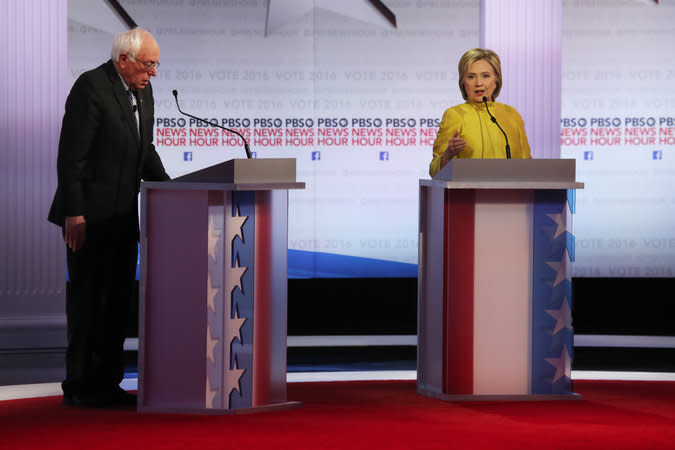PBS Democratic Debate: Not Exactly A 'Downton Abbey' Dinner

As could have been predicted after the substantial loss Hillary Clinton suffered at the hand of Bernie Sanders in the New Hampshire primary, Thursday night’s Democratic debate featured more pointed attacks from both candidates–but the greatest aggressor was Sanders, not Clinton. Health care, campaign finance reform, immigration control, and Henry Kissinger were key areas of disagreement. The debate, sponsored by PBS (also airing on CNN), was moderated by Judy Woodruff and Gwen Ifill, and was thus the first debate in this election season overseen by an all-woman panel.
Anyone presuming that this debate would take the same scrupulously polite tone that prevails every night on the PBS NewsHour, however, would be wrong. This was no Downton Abbey tea party: Some of Woodruff and Ifill’s questions were, alas, occasionally as hackneyed and expedient as any posed by the other TV networks at previous debates.
For example: “Is it fair for Americans who fear [big] government to fear you?” Ifill asked Clinton. That’s straight out of the Fox News talking-points memo. (Though not, I should say, from the Fox News moderators at their debates.) Woodruff brought up the much- and ridiculously-derided comment Madeleine Albright made — “There’s a special place in hell for women who don’t help women” — to try and force Clinton to repudiate it. Here’s the thing: Is there no one in the media who understands that Albright was making a wry, self-deprecating joke about a line she’s been using for more than a decade?
And a third, especially awful question was lobbed at Sanders when he was asked whether a victory for him “would be thwarting [the election of] the first women President.” You can poke at Sanders for a variety of policy positions, but sexist thwarter isn’t one of them.
After one Clinton response in which she referred to what she would do if she became President, Sanders said sharply, “Secretary Clinton, you’re not in the White House yet!” He paused, and I realized, he’s waiting for the applause. He had a scripted line he pulled out, something Sanders is rarely caught doing, and with good reason — this zinger was met with some audience murmurs and, for the rest, stony silence.
Sanders began the night hitting the same subjects he’s hit before, often with the same phrases: “a massive transfer of wealth”; “income inequality”; under his health care plan, Americans will see their income taxes rise $500 and save $5,000 a year in health-care costs. If I were a more waspish fellow, I’d say he was as repetitive in his way as Marco Rubio was pilloried for being in the last Republican debate.
Sanders tried to wound Clinton for admiring remarks she’s made about a previous Secretary of State, Henry Kissinger. “I am proud to say that Henry Kissinger is not my friend,” said Sanders, accusing Kissinger of being a profoundly “destructive” government official for his policies during the Vietnam War. Sanders stopped just short of using the phrase “war criminal.”
It was kind of interesting to hear both candidates talk about issues of race and oppression. They fell over each other to court black voters, and in the process, sounded rehearsed—neither speaks from the heart as well as the head on the subject of race, which is unusual in the recent history of Democratic candidates.
Toward the end, Clinton and Sanders fell into a tediously long tit-for-tat argument over who loved or disliked President Obama more. When the moderators tried to wrap that up and called for final statements, Sanders slipped in a sucker-punch: “One of us ran against Barack Obama; I was not that candidate.”
That Bernie — for a guy who styles himself an anti-politician, he’s becoming quite the sly career politician.


